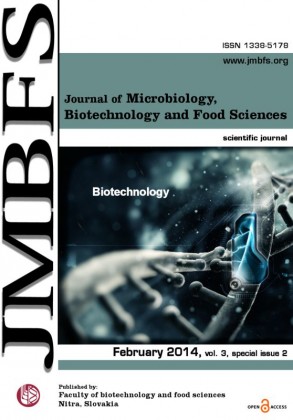DNA ANALYSIS OF RICIN USING RAPD TECHNIQUE
Keywords:
ricin, RAPD technique, genetic diversityAbstract
Castor (Ricinus communis L.) is an important plant for production of industrial oil. The systematic evaluation of the molecular diversity encompassed in castor inbreds or parental lines offers an efficient means of exploiting the heterosis in castor as well as for management of biodiversity. The aim of this work was to detect genetic variability among the set of 30 castor genotypes using 5 RAPD markers. Amplification of genomic DNA of 30 genotypes, using RAPD analysis, yielded 35 fragments, with an average of 7,00 polymorphic fragments per primer. Number of amplified fragments ranged from 5 to 9, with the size of amplicons ranging from 100 to 1200 bp. The polymorphic information content (PIC) value ranged from 0,662 to 0,855 with an average of 0,780 and diversity index (DI) value ranged from 0,669 to 0,857 with an average of 0,785. The dendrogram based on hierarchical cluster analysis using UPGMA algorithm was prepared. Knowledge on the genetic diversity of castor can be used for future breeding programs for increased oil production to meet the ever increasing demand of castor o il for industrial uses as well as for biodiesel production.Downloads
Download data is not yet available.
Downloads
Published
2014-02-01
How to Cite
Vivodík, M., Balážová, ½elmíra, & Gálová, Z. (2014). DNA ANALYSIS OF RICIN USING RAPD TECHNIQUE. Journal of Microbiology, Biotechnology and Food Sciences, 3(special issue 2 (Biotechnology), 181–183. Retrieved from https://office2.jmbfs.org/index.php/JMBFS/article/view/7648
Issue
Section
Biotechnology
License
Copyright (c) 2014 Martin VivodÃk, ŽelmÃÂra Balážová, Zdenka Gálová

This work is licensed under a Creative Commons Attribution 4.0 International License.
All papers published in the Journal of Microbiology, Biotechnology and Food Sciences are published under a CC-BY licence (CC-BY 4.0). Published materials can be shared (copy and redistribute the material in any medium or format) and adapted (remix, transform, and build upon the material for any purpose, even commercially) with specifying the author(s).

